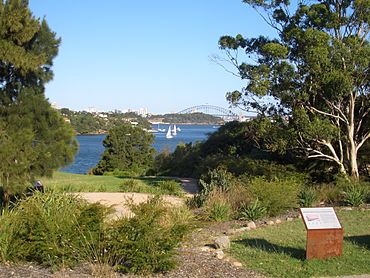Woolwich, New South Wales facts for kids
Quick facts for kids WoolwichSydney, New South Wales |
|||||||||||||||
|---|---|---|---|---|---|---|---|---|---|---|---|---|---|---|---|

Woolwich Lookout
|
|||||||||||||||
| Population | 814 (2016 census) | ||||||||||||||
| Postcode(s) | 2110 | ||||||||||||||
| Location | 11 km (7 mi) west of Sydney CBD | ||||||||||||||
| LGA(s) | Municipality of Hunter's Hill | ||||||||||||||
| State electorate(s) | Lane Cove | ||||||||||||||
| Federal Division(s) | North Sydney | ||||||||||||||
|
|||||||||||||||
Woolwich is a cool suburb located on the Lower North Shore of Sydney, New South Wales, Australia. It's about 11 kilometers north-west of the main city area, the Sydney central business district. Woolwich is part of the Municipality of Hunter's Hill. It sits on a piece of land that sticks out into the water, between the Lane Cove River and the Parramatta River.
Contents
History of Woolwich
How Woolwich Got Its Name
The name Woolwich comes from a place with the same name in London, England. That Woolwich is on the banks of the Thames River. The Parramatta River in Sydney was even called the 'Thames of the Antipodes' (meaning the opposite side of the world). Other nearby suburbs like Greenwich and Putney are also named after towns along the Thames.
Aboriginal Name and Early Settlers
The original Aboriginal name for this area is 'Mookaboola' or 'Moocooboola'. This name means meeting of waters, which makes sense because of the rivers nearby! One of the first settlers was John Clarke, who bought land here in 1834. That's why a spot called Clarke's Point is named after him. Another early landowner was Samuel Onion. He had a business that sold iron goods. In 1835, he gave the suburb its first name: 'Onion Point'.
Saving Kelly's Bush
Woolwich is famous for a special event called the world's first union-led green ban. This happened when a group of workers, led by Jack Mundey and the Builder's Labourers Federation, decided to protect a local area called 'Kelly's Bush'. They didn't want it to be destroyed for new buildings. They fought hard and won their battle! Because of them, 'Kelly's Bush' is still there today.
Historic Buildings in Woolwich
Woolwich has many old and important buildings. There are 61 properties listed on the New South Wales State Heritage Register. This means they are officially protected because of their history. Some of these include the Woolwich Pier Hotel and the Woolwich Wharf.
You can also find other interesting old places around the area. For example, St John’s Anglican Church was built in 1908. It had a simple, old-fashioned design. Later, it became a theater and then a house. It was recently updated in 2020 by Arc Architects and Michiru Higginbotham.
Woolwich Population
Who Lives in Woolwich?
In 2016, a survey counted 814 people living in Woolwich. Slightly more than half (53.1%) were female, and 46.9% were male. The average age of people living there was 51 years old.
Most people (72.5%) in Woolwich were born in Australia. Also, most people (78.6%) spoke only English at home. When asked about their religion, the most common answers were Catholic (32.1%), No Religion (28.6%), and Anglican (19.8%).
Income and Jobs
The average weekly income for households in Woolwich was $3,211. This is much higher than the average for all of Australia, which was $1,438. In fact, for the years 2016–2017, the area of Woolwich and Hunters Hill was ranked as the 10th wealthiest suburb in Australia! Many people in Woolwich work in professional jobs.
Gallery
-
Woolwich ferry wharf provides access to the Cockatoo Island ferry services which run services between Circular Quay and Cockatoo Island.
-
View from Longueville Wharf
Schools in Woolwich
Woolwich has two main schools:
- Marist Sisters' College, Woolwich
- Woolwich Public School
Images for kids
 | John T. Biggers |
 | Thomas Blackshear |
 | Mark Bradford |
 | Beverly Buchanan |








